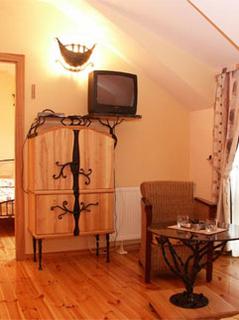For several years the position of Polish exporters on the markets of the former Commonwealth of Independent States has been clearly weakening
Published:
5 May 2003 y., Monday
In order to spur on trade, presentations of Polish exporters are gaining popularity. One such presentation is the Polish National Exhibition in St. Petersburg.
Geographic proximity, relatively small competition from local manufacturers who are not capable of satisfying the growing demand for modern products and, contrary to common belief, the increasingly wealthy and demanding customer, are the advantages of the "eastern market." Why then does trade with the countries of the Commonwealth of Independent States (CIS) constitute as little as 7.1 percent of the global value of Polish export?
The position of Polish companies is weakened by competition from the Western businesses that are perfectly aware of the perspectives which an active and strategically planned entry into Eastern markets can accomplish. Entrepreneurs from Germany, France and the United States, supported by the appropriate funds, first promote and then successfully sell their products in Russia and Ukraine or make direct investments there.
The decrease in the amount of Polish agriculture and food products exported to Eastern markets has stemmed from the fact that big international concerns such as Nestlé, Danone or Unilever directly entered this strategic area. However, the issue of Western competition is only a part of the answer to this question and the possibility of development for Polish exporters on the markets in the former Soviet Union.
One of the most serious difficulties Polish companies encounter is a considerable risk connected with signing commercial contacts with partners from the East who frequently appear to be insolvent and do not honor their contracts. According to Robert Stawski from the Promotion Chamber of the Polish Chamber of Commerce, businesspeople from Russia frequently do not understand the term "advance payment" and sometimes want to pay for the products only after they sell them. For obvious reasons, these terms are hard to accept for Polish manufacturers, which are mostly small and medium-sized companies. The state does not guarantee any protection for companies against situations in which partners from Russia, Belarus or Ukraine do not fulfill the terms of a commercial contract.
Šaltinis:
warsawvoice.pl
Copying, publishing, announcing any information from the News.lt portal without written permission of News.lt editorial office is prohibited.
The most popular articles
 On 31 August 2009 in a non-public way AB Bank SNORAS issued the emission of perpetual debt securities included into the bank capital amounting to LTL 72.5 million.
more »
On 31 August 2009 in a non-public way AB Bank SNORAS issued the emission of perpetual debt securities included into the bank capital amounting to LTL 72.5 million.
more »
 The European Commission, through its longstanding cooperation with the US and Canada, announces the launch of 33 new and innovative projects involving universities and training institutions on both sides of the Atlantic.
more »
The European Commission, through its longstanding cooperation with the US and Canada, announces the launch of 33 new and innovative projects involving universities and training institutions on both sides of the Atlantic.
more »
 Today at the VII World Congress on Alternatives and Animal Use in the Life Sciences in Rome, the European Commission and the European cosmetic industry presented their joint financial effort for research into alternative safety testing methods.
more »
Today at the VII World Congress on Alternatives and Animal Use in the Life Sciences in Rome, the European Commission and the European cosmetic industry presented their joint financial effort for research into alternative safety testing methods.
more »
 SEB Bank, the largest bank in Lithuania, invests almost LTL 4.6 million in to the upgrade of its data transmission network.
more »
SEB Bank, the largest bank in Lithuania, invests almost LTL 4.6 million in to the upgrade of its data transmission network.
more »
 The World Bank’s Board of Executive Directors today approved a credit of US$ 36.6 million equivalent of additional financing for the Lifeline Road Improvement Project for Armenia.
more »
The World Bank’s Board of Executive Directors today approved a credit of US$ 36.6 million equivalent of additional financing for the Lifeline Road Improvement Project for Armenia.
more »
 The Executive Board of the International Monetary Fund (IMF) today completed the first review of Latvia's performance under an economic program supported by a 27-month Stand-By Arrangement.
more »
The Executive Board of the International Monetary Fund (IMF) today completed the first review of Latvia's performance under an economic program supported by a 27-month Stand-By Arrangement.
more »
 The Commission has today decided to close the formal investigation procedure into the privatisation and restructuring of Austrian Airlines concluding that the restructuring following its sale to Lufthansa is compatible with community law.
more »
The Commission has today decided to close the formal investigation procedure into the privatisation and restructuring of Austrian Airlines concluding that the restructuring following its sale to Lufthansa is compatible with community law.
more »
 Ben Bernanke's reappointment as head of the Federal Reserve did not come as a surprise, but Wall Street still responded with the proverbial thumbs up.
more »
Ben Bernanke's reappointment as head of the Federal Reserve did not come as a surprise, but Wall Street still responded with the proverbial thumbs up.
more »
 Over I half-year 2009 accommodation establishments had by 22 per cent less guests.
more »
Over I half-year 2009 accommodation establishments had by 22 per cent less guests.
more »
 In the first such transaction in Russia, carbon credits generated by utilising gas which would otherwise be flared at an oilfield in eastern Siberia are to be purchased through a carbon fund set up by the EBRD and the European Investment Bank (EIB), the Multilateral Carbon Credit Fund (MCCF).
more »
In the first such transaction in Russia, carbon credits generated by utilising gas which would otherwise be flared at an oilfield in eastern Siberia are to be purchased through a carbon fund set up by the EBRD and the European Investment Bank (EIB), the Multilateral Carbon Credit Fund (MCCF).
more »